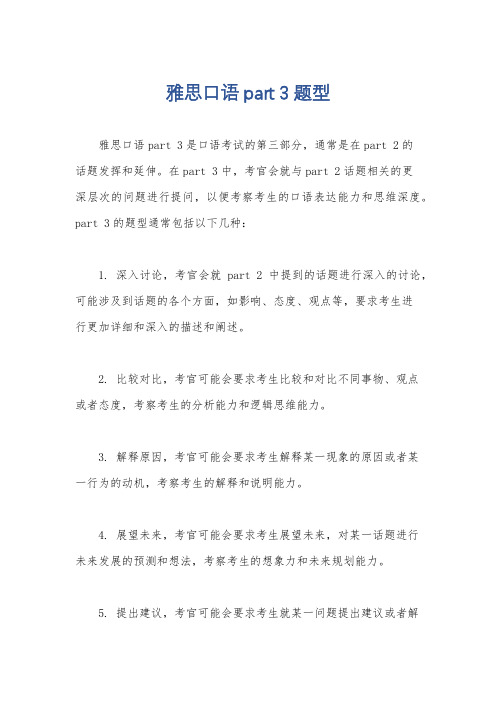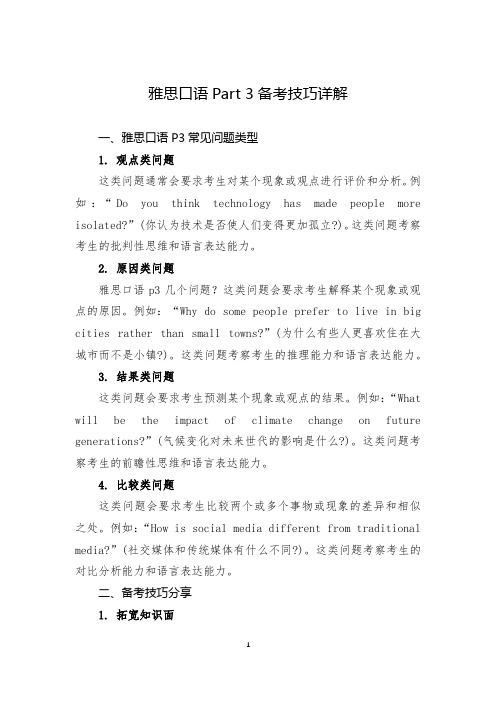雅思口语(Part3)
雅思口语part 3题型

雅思口语part 3题型
雅思口语part 3是口语考试的第三部分,通常是在part 2的
话题发挥和延伸。
在part 3中,考官会就与part 2话题相关的更
深层次的问题进行提问,以便考察考生的口语表达能力和思维深度。
part 3的题型通常包括以下几种:
1. 深入讨论,考官会就part 2中提到的话题进行深入的讨论,可能涉及到话题的各个方面,如影响、态度、观点等,要求考生进
行更加详细和深入的描述和阐述。
2. 比较对比,考官可能会要求考生比较和对比不同事物、观点
或者态度,考察考生的分析能力和逻辑思维能力。
3. 解释原因,考官可能会要求考生解释某一现象的原因或者某
一行为的动机,考察考生的解释和说明能力。
4. 展望未来,考官可能会要求考生展望未来,对某一话题进行
未来发展的预测和想法,考察考生的想象力和未来规划能力。
5. 提出建议,考官可能会要求考生就某一问题提出建议或者解
决方案,考察考生的应变能力和解决问题的能力。
总的来说,雅思口语part 3的题型是比较开放和灵活的,考官
会根据part 2的话题和考生的回答情况来提出更深入和具体的问题,要求考生进行更加细致和深入的回答,以展现其口语表达能力和思
维深度。
考生在准备口语考试时,需要多加练习,提高自己的口语
表达能力和思维深度,以应对各种类型的part 3问题。
雅思口语考官范文Part3--和运动有关的3个问题及答

1. Why do you think sport is important?I think sport is important for different reasons. For me, doing a sport is about having fun. When I play football, for example, I forget about everything else and just enjoy myself. Also, doing a sport helps you to keep fit and healthy, and it's a good way to socialise and make friends.我认为体育是重要的,有很多原因。
对我来说,做运动是有乐趣的。
⽐如说,当我踢⾜球的时候,我忘记其它⼀切只是享受踢球的乐趣。
同时,做运动可以帮助你保持健康,⽽且这也是社交和交朋友的好⽅法。
2. Do you think famous sportspeople are good role models for children?I think that sportspeople should be good role models. Children look up to their favourite football players, like David Beckham for example, so I think that these people have an enormous responsibility. They should try to be a good influence, and behave in the right way.我认为运动员应该是好的榜样。
孩⼦们最喜欢的⾜球运动员,⽐如⼤卫贝克汉姆,我认为这些⼈有巨⼤的责任感。
雅思口语(Part3)

Do men and women have the same tastes in books?
核心重点
• 导入
• Well clearly… • Sure, without a doubt… • Well undoubtedly • 很多不同 • There are a variety of possible differences here. • There are a range of potential distinctions here. • 相同 • Both A and B are… • Like A, most B… • Similarly,…
对比类 (Compare and contrast)
对对比比类类(Co(Cmopmaprearaenadncdocnotrnatsrta)st)
• 横比 • Do men and women have the same tastes in books? • Do old and young people like the same holidays?
预对测比将类来((PCroemdipctairnegaannddcsopnetcrualsatt)ing)
• What will houses be like in the future? • What will cars be like in the future? • What types of hobbies will become popular in the future? • What will shopping habits be like in the future? • What do you think your country will be like in about 20
雅思口语part3答案

雅思口语part3答案【篇一:雅思口语范文part3:和a dinner有关】是关于a dinner,来看一下相关的6个问题及答案:》》》点击查看:雅思评分标准,知己知彼才能提分~1.do chinese people like to eat at home?yes, people in china often like to eat at home because someone in their family cooks rather well and because it’s cheaper. my grandmother lives with us and she is an excellent cook so i prefer to eat her food than going out to restaurants except on special occasions with my friends.2.how often do chinese people eat out?this is like asking, how often do chinese people brush their teeth? everyone is different. some families don’t have the time to cook and no one knows how to cook well and they have the money to eat at restaurants often so they do. other families have someone in their family who cooks well and they can’t afford to eat out very often so they stay at home to eat.3.why do some people like to eat alone?some people like to eat alone because that has been their habit since they were young. my friend often eats alone because when he was 6 or 7 years old his parents had already gone off to work and left his breakfast in the kitchen or he had to make some simple meals himself.4.are there any disadvantages of eating outside?the disadvantages are that you have no idea what ingredients they are using to prepare your food. the other thing is that you have no idea how fresh the seafood is or how long fast food burgers have been frozen, so i rarely eat out unless i know that the food is good5.what’s the difference between having meals at home in a restaurant?first, you know the ingredients and know if they are healthy. second, you know whose doing the cooking. and even more important, you know how clean your kitchen is compared to the restaurant.6.why do some people keep eating healthy food even if they already know the harm?my father is a good example of that. he ate most of his meals outside except for an occasional dinner at home. most of his breakfasts were gotten at a fast food drive thru restaurant while he was driving to work. at lunch he often went to business lunches at expensive restaurants that prepare rich calorie food that tastes great but make you fat. only sometimes he ate at home in the evenings. all of this time he was so busy that he didn’t stop to consider the health effects it had on his body.【篇二:雅思口语part3问题总结与解析】ass=txt>雅思口语part3问题总结与解析为了大家能更好的备考雅思考试,前程百利雅思小编特为大家整理雅思口语part3问题总结与解析,包了最新雅思听说读写备考资料,以及最权威的参考书,处于备考中的考生们,还等什么呢!1. 原因论述类考题:在回答这种类型的雅思口语考题时, ----问题的重点,且一定要紧扣此重点, 不能游离出去------探寻原因,这样,思路就能更加开阔,更能做到有话可说。
雅思口语Part 3备考技巧详解

雅思口语Part 3备考技巧详解一、雅思口语P3常见问题类型1. 观点类问题这类问题通常会要求考生对某个现象或观点进行评价和分析。
例如:“Do you think technology has made people more isolated?”(你认为技术是否使人们变得更加孤立?)。
这类问题考察考生的批判性思维和语言表达能力。
2. 原因类问题雅思口语p3几个问题?这类问题会要求考生解释某个现象或观点的原因。
例如:“Why do some people prefer to live in big cities rather than small towns?”(为什么有些人更喜欢住在大城市而不是小镇?)。
这类问题考察考生的推理能力和语言表达能力。
3. 结果类问题这类问题会要求考生预测某个现象或观点的结果。
例如:“What will be the impact of climate change on future generations?”(气候变化对未来世代的影响是什么?)。
这类问题考察考生的前瞻性思维和语言表达能力。
4. 比较类问题这类问题会要求考生比较两个或多个事物或现象的差异和相似之处。
例如:“How is social media different from traditional media?”(社交媒体和传统媒体有什么不同?)。
这类问题考察考生的对比分析能力和语言表达能力。
二、备考技巧分享1. 拓宽知识面为了在雅思口语P3环节中更好地应对各种问题,考生需要拓宽自己的知识面,关注时事热点、社会现象、科技发展等方面的信息。
这样可以帮助考生更好地理解问题,提供更深入的分析和见解。
2. 培养逻辑思维能力逻辑思维能力是雅思口语P3环节的重要考察点。
考生可以通过阅读逻辑推理类文章、参加辩论活动等方式培养自己的逻辑思维能力。
同时,在备考过程中,也要注重练习如何用逻辑清晰、条理分明的语言表达自己的观点。
雅思口语Part3详解

雅思口语Part3详解今天五月花留学将给各位烤鸭详细解析雅思口语Part3。
Part3是Part2的延伸,问题范围和Part2一致。
比起Part1的生活类问题,Part3的问题更有深度和广度,它的本质是讨论,此部分考察学生的辩证性思维以及论证能力。
Part 1:雅思口语Part3介绍Part2:雅思口语Part3答题关键Part3的问题答题时有2个很重要的原则,一是Speak at length,二是站在多个角度答问题。
1. 个人观点类问题此类问题大致如下:你认为…怎么样?你做过…吗?你认为…重要吗?一些人认为…,你同意吗?如果…你会怎么做?这类型的问题考察的是个人经验,对某个事物的看法,即描述某事某物的重要性/意议/价值等。
个人观点类问题答题时可以有三种角度:*No1. 正面出击。
(从正面阐述+举例。
)*No2. 反例法。
(从反面论证一件事物的重要性,即如果没有这个东西或者不做这件事会有什么不好的影响。
)*No3. 正+反结合。
(正面说一点,反面说一点)2. 差异对比类问题雅思口语Part3很喜欢问对比类的话题,可以细分为三大类:①事物对比答题可以有两种方式:*思路1:introduction(答案的开头句)+A的特点/优缺点+B的特点/优缺点+example(举一个具体的例子来解释A和B之间的差异)或者:*思路2:introduction+ A的特点/优缺点&example+ B的特点/优缺点&example+ reasons(具体解释一下产生A和B之间差异的原因)②人群对比答题:此类问题考察不同人群对待同一件事物或某种现象的看法,即你对二者人生观与态度的认知。
答题时需要站在不同的人物角度来作答:Introduction+For men...+From the women’s perspective ...+Conclusion.③时间对比答题:涉及时间类的问题主要考察事物的发展过程、发展趋势并未来展望(potential),答题时:有对比现象(如:以前的交流工具和现在的交流工具有什么不同?),两个时间段都描述,描述事物特征、样子;无对比现象,分点阐述,注意逻辑、时态。
雅思口语part 3 答题思路实例解析

雅思口语part 3 答题思路实例解析雅思口语中Part3有关人类行为对生态影响类话题是十分常见的话题。
讨论的角度可以从宏观的层面上来讨论,人类本身的行为如何影响了地球的整体自然环境;亦可以从微观角度分析,人类的某些行为是如何影响某物种的生活习性,例如改变了物种的捕食习惯,繁衍地等。
下面我们通过举例:海龟由于人类行为而形成的新的坏习惯,给大家呈现,人类行为对生态的影响,是如何论证的。
1.Turtles have an unfortunate habit of devouring plastic objects floating in the sea.These then get snared in their alimentary canals, cannot be broken down by the animals' digestive enzymes and may ultimately kill them.It is widely assumed that this penchant for plastics is a matter of mistaken identity.Drifting plastic bags, for instance, look similar to jellyfish, which many types of turtles love to eat. Yet lots of plastic objects that end up inside turtles have no resemblance to jellyfish.【翻译】海龟有一个坏习惯,就是吞食漂浮在海里的塑料制品。
然后这些东西会陷入消化道,无法被动物的消化酶分解,并最终可能致死。
人们普遍认为,这种对塑料的嗜好是一种错误的识别。
例如,漂浮的塑料袋看起来就像许多海龟喜欢吃的水母。
【思路】对于这类话题,我们首先可以阐述事实情况,然后展现出大多数人的一种普遍想法,最后通过科学的研究来展现出导致该事实发生的真实原因。
雅思口语part3

Topics of part threetopic1, lets try:●我很喜欢踢足球,特别是踢前锋(play forward)的位置,做主攻(attacker, striker)是让我特别兴奋的事情●虽然我不喜欢跳舞,但是我喜欢观看舞蹈表演(dance performance), 比如芭蕾(ballet),这是一种特别优雅(elegant)的舞蹈●花在中国文化中有很重要意义,比如牡丹(peony)是中国的国花(national flower),象征(symbolize)着富贵(prosperity and wealth)●比起宅在家里,我更喜欢户外活动,比如遛狗(walk dog)或者和朋友聚聚(hang out withfriends)●我从小喜欢阅读,特别是金庸(Yeong King)的武侠小说(martial art fiction / Kung-fu fiction)我总是幻想(imagining/fantasize)我就是故事中拯救人们的超级英雄●我不太喜欢看电视节目,特别是一些综艺节目(entertainment show), 我觉得这些节目不仅没有内容而且品味低俗(neither informative nor proper)●我非常喜欢旅游,特别是去前不着村后不着店(in the middle of nowhere)的地方,因为这种抛开一切(get away from it all)的感觉太棒了●我从小就很喜欢看纪录片(documentary),特别是有关野生动物的纪录片●我很喜欢听音乐,特别是电影原声音乐(movie sound track),我最崇拜的(admire)作曲家(composer)是John William以及在电影《辛德勒的名单》(Schindler's list)中的小提琴独奏(violin solo)●我最喜欢的季节是冬季,因为有许多喜欢的事情只有在下雪的冬天(snowy winter)可以做,比如我最喜欢的滑雪(skating)和打雪仗(snow fight)●我很喜欢参观博物馆特别是历史博物馆,因为这是了解一个城市文化和历史的窗口(window/access/bridge)●我从没有学过跳舞,事实上我我从不喜欢跳舞,因为我不是一个肢体很协调(physicalcoordination/physically coordinated)的人●我非常讨厌榴莲(durian)的味道(flavor/taste),虽然它被视为水果之王(king of fruits),有很高营养(rich nutrition),但是我实在无法忍受这种热带水果(tropical fruit)的强烈味道●一天中我最不喜欢的时段是清晨,特别是大冬天的一早要早起是很痛苦(miserable/suffering/painful)的一件事,我觉得我永远都睡不够●长途旅行(long distance travel)我最讨厌的就是倒时差(jet lag)topic2●我每年出国旅游至少一次(travel abroad)●我爸爸总是出差(on business trip)所以很少在家和我们(我和我妈)一起吃饭●广州的冬天几乎不下雪●我的爷爷奶奶偶尔会下馆子(eat out)吃饭,但他们总是觉得饭店的食物又油腻(greasy/oily)又不卫生(unsanitary)●我和好朋友有时候会去看部电影来放松,(for relaxation/to relax and unwind)●我爸爸每周游三次泳●虽然我和我表弟住的很远,但我们会时不时聚一聚●我舅舅常常到我家问我妈借钱●我很少见到隔壁邻居,可能是因为我的工作不是朝九晚五(from 9 to 5),所以我们在不同的时间进出topic3●我小的时候爷爷奶奶照顾我的(look after...)●我以为我开会迟到了,结果发现会议取消了(turn out / call off)●我最喜欢的颜色是蓝色,因为蓝色可以让我平静(calm... down)●当我知道这个好消息之后,我得瑟地在商店里花光了我所有的钱(be carried away)●在告别派对上,我们几个同事凑份子给Mary买了一份礼物(chip in)●过去的一年,公司的生意开始回暖,我也涨了工资(pick up)●我从小就学习很努力,因为我不想让我母亲失望,她五年前下岗了(let...down/lay...off) ●毕业后我最好的朋友去了一个离北京很远的城市工作,我们就渐行渐远了(drift apart) ●当我的朋友和他五年的女友分手后,我告诉他要忘掉过去勇往直前。
- 1、下载文档前请自行甄别文档内容的完整性,平台不提供额外的编辑、内容补充、找答案等附加服务。
- 2、"仅部分预览"的文档,不可在线预览部分如存在完整性等问题,可反馈申请退款(可完整预览的文档不适用该条件!)。
- 3、如文档侵犯您的权益,请联系客服反馈,我们会尽快为您处理(人工客服工作时间:9:00-18:30)。
• •
核心重点
•
•
Linking word: • In addition… • On top of this… • Moreover… 对比词 • While on the other hand… • Conversely…
对比类 (Compare and contrast) 对比类 (Compare and contrast)
预测将来 andcontrast) speculating) 对比类 (Predicting (Compare and
• • • • •
What will houses be like in the future? What will cars be like in the future? What types of hobbies will become popular in the future? What will shopping habits be like in the future? What do you think your country will be like in about 20 years time?
Effie
Contents 内容摘要
Part 3
• 怎样开始
• Ok, we’ve been talking about…, and now I’d like to ask you some general questions related to this topic. First of all, …
• What do you think life will be like for children in the future? • Well, on the bright side, I believe that there will be more colorful lives for kids, cause…. However, at the same time, I guess children in the future will have to deal with…
语法必备 将来完成时 对比类 -(Compare and contrast)
• The future perfect is used to talk about things that will have been completed or finished at or by a certain point in the future. • Eg. • I will have eaten my dinner by 8 p.m. • We will have found cures for many serious diseases like cancer or Aids in about 50 years. • Many believe that in only a few years far more endangered species will have become extinct.
Good or bad? ?
对比类 (Compare and contrast)
• 横比 • Do old and young people like the same holidays? Well obviously, there are a number of clear differences. However, the most significant would be that old people are more likely to prefer traditional festivals such as the spring festival. Whereas in contrast young guys tend to prefer western festivals such as Valentine’s day and Christmas, as these holidays are more fashionable and romantic. Let’s try~~ Do men and women have the same tastes in books?
语法必备 第一条件句 对比类 -(Compare and contrast)
• If + present verb + will + present verb • Eg. • If we continue to treat wildlife animals in this way, we will be in serious trouble in the future. • It is extremely likely that…/ probable that….possible that… • It is highly possible that we will face severe problem in only a couple of years if we don’t solve the current traffic problems soon.
•
注意时态 • In the past, did! • A few years ago, did!! • 20 years ago, did!! • X used to be much slower… • X always used to be more… • Could/ couldn’t
预测将来(Predicting and speculating)
预测将来 andcontrast) speculating) 对比类 (Predicting (Compare and
• 导入 • Well, it’s hard to predict because things change so fast and unexpected things happen all the time. • Well, that’s a tough question. • Yes, actually, I’ve thought about this lately. • I think that given the current situation… • Taking into account the problems we are facing… • Since… • Given that our government is making so much effort… • Based on what I’ve seen/ known… • To the best of my knowledge… • I guess/ suppose/ imagine… • There is a chance that… • I don’t see it coming.
对比类 (Compare and contrast)
•
横比 • Do old and young people like the same holidays? I think old people and young people like different holidays, for example elderly people are fond of traditional holidays such as spring festival, but young guys like western holidays such as Valentine’s day and Christmas.
语法必备 将来进行时 对比类 -(Compare and contrast)
• The future continuous is used to talk about something that we think will happen in the future and will continue to happen for a period of time, rather than a sudden or a finished event in the future. • Eg. • The Chinese society will be developing for many years to come. • By 2016 I will be studying in New York. • By next century, some say that we will perhaps be living on other planets.
• 特点难点
• 问题形式多样,抽象,无时间准备
• 重要性
Part 1的6+1类问题
“8”类 • • • • 对比类 (Compare and contrast) 预测将来(Predicting and speculating) 优缺点(Advantages and disadvantages) 个人意见(Opinions; agree or disagree)
预测将来 andcontrast) speculating) 对比类 (Predicting (Compare and
• What will cars be like in the future? • Well, I guess, I don’t know whether it’s a bit crazy to think that in the near future, cars will be driven off – ground, so in-the-air, I mean, cars in the future will have doors that ‘expand into wings’. We have already watched so many movies depicting such scenes.
核心重点
•
导入
• Well clearly… • Sure, without a doubt… • Well undoubtedly 很多不同 • There are a variety of possible differences here. • There are a range of potential distinctions here. 相同 • Both A and B are… • Like A, most B… • Similarly,…
